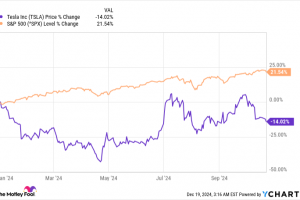
Bear Market Stocks Plunge Crash Invest Correction Getty
There’s no question that the resolve of investors has been tested numerous times since this decade began. Wall Street’s three major stock indexes have ping-ponged between bull and bear markets on a couple of occasions over the past four years, with the growth-focused Nasdaq Composite (NASDAQINDEX: ^IXIC) gyrating the most.
As of the closing bell on Dec. 20, the Nasdaq Composite had rallied 41% year to date and nearly 45% from its 2022 bear market closing low of 10,213.29 on Dec. 28, 2022. Nevertheless, the Nasdaq remains 8% below its record-closing high, which was set in November 2021.
Image source: Getty Images.
Short-term traders are likely to view the past 25 months as a lost period for growth stocks. But for patient investors who lean on time as an ally, dips in the Nasdaq Composite are nothing more than red-carpet opportunities to pounce on great companies at a discount.
What follows are four colossal growth stocks you’ll regret not buying in the wake of the Nasdaq bear market dip.
Alphabet
The first industry juggernaut that’s begging to be bought with the Nasdaq Composite still meaningfully below its record-closing high is Alphabet (NASDAQ: GOOGL)(NASDAQ: GOOG), the parent company of popular internet search engine Google, streaming platform YouTube, and autonomous-vehicle company Waymo, among other ventures.
The best argument I can muster for why Alphabet isn’t taking out its record high right now is because investors are worried about a recession in 2024. A couple of economic data points and predictive tools indicate that a downturn is likely in the new year. Since Alphabet generated 78% of its sales from advertising during the September-ended quarter, there’s a very real likelihood that economic weakness would sap ad spending and some of its ad pricing power (at least temporarily).
But the U.S. economy is a two-way street that very much favors optimists. While the typical recession lasts for less than a year, most periods of economic growth since the end of World War II have endured for multiple years, if…
..






